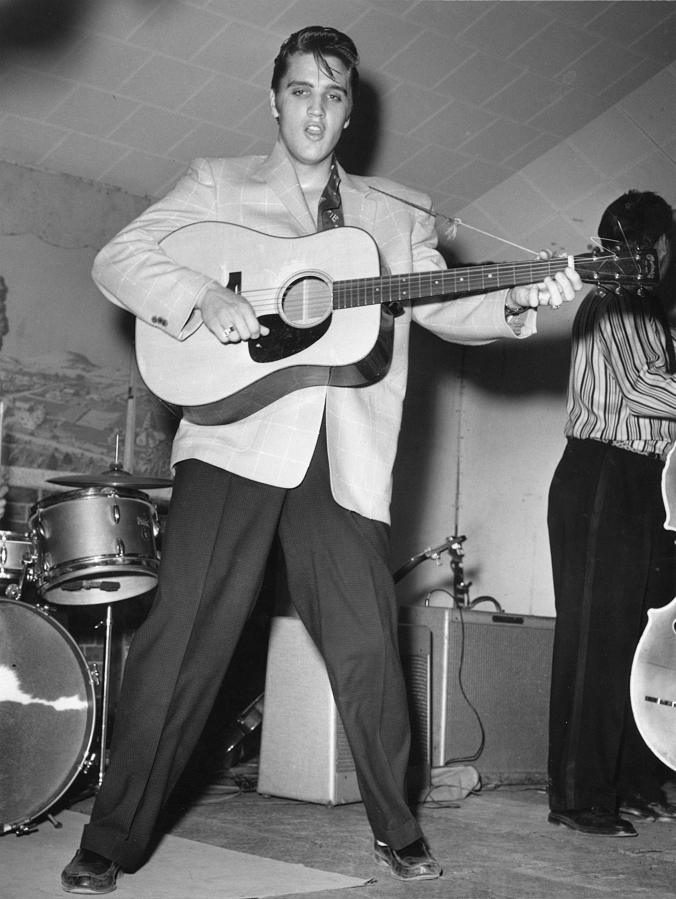Icon? Sex symbol? Menace to society? Hero? Drug addict? The King?
There is only one Elvis Presley, but there are also many Elvis Presleys.
No, that’s not an existential riddle about the hip-swiveling, lip-curling singer who irrevocably changed the sound and look of contemporary music, and — with it — popular culture in the 1950s and beyond.
Nor is it a reference to the estimated 35,000 Elvis impersonators still active around the world today, 40 years after the intensely charismatic singer hailed as “The King” permanently left the building on Aug. 16, 1977. He died from a drug-fueled heart attack in Memphis in his famed Graceland mansion, which still draws 600,000 visitors a year (second in the U.S. to the White House).
Only 42, Elvis reportedly weighed 350 pounds at the time of his death — 187 pounds more than when he was 32. He tested positive in his autopsy for 10 different prescription medications, including 10 times his prescribed amount of codeine.
Yet, while he died far too young, Elvis had seemingly lived several lifetimes in just over four decades.
He was a sometimes scorned high school student, an impoverished truck driver, an aspiring singer, a wealthy pop music superstar, a sergeant in the U.S. Army, a smoldering sex symbol, a movie idol, a middle-of-the-road Las Vegas showroom staple, a bloated, drug-addled victim of fame, and more.
Most significant of all. Elvis was the proto-rock star, an inadvertent revolutionary and a game-changing cultural phenomenon, whose impact extends from The Beatles and U2 singer Bono to Bruno Mars and beyond.
“He is about as iconic as anyone in American music gets,” John Oates of Hall & Oates said.
“When Elvis came on the scene it was like an unbridled and untamed beast had arrived,” Paul Stanley of Kiss said.
“There was a sexuality, a danger and a joy in what he was doing that was the sign of a phenomenon. You see early footage of him, shimmying across the stage and playing for these screaming crowds — he was that generation’s template for everything that came after him and everyone copied that template.”
Indeed, no other solo singing star — not Bing Crosby, Frank Sinatra, Michael Jackson, Madonna or Beyonce — has matched Elvis. His influence and example helped pave the way — directly or indirectly — for The Beatles, Bob Dylan, and countless others.
“Elvis is my man,” Paul McCartney said. “He was a big influence on the Beatles.”
“There were other American greats, but it was Elvis we talked about,” former Beatles’ drummer Pete Best said. “The effect he had on all the members of The Beatles showed, from our repertoire to the way we played the music and handled ourselves on stage.”
Ringo Starr, who replaced Best in The Beatles, echoed his fellow drummer’s enthusiasm.
“Elvis turned my head around,” Starr said. “Frankie Laine, who I liked (in the early 1950s) was like my dad; everyone you listened to was like your dad, until Elvis came out.”
Similar sentiments are voiced by such disparate artists as “American Idol” winner David Cook, neo-R&B vocal star Maxwell, “Idol” alum Haley Reinhart and multiple-Grammy Award-winner k.d. lang.
“I think Elvis changed the dialogue, and maybe the morality, of the entire country. The cultural impact he had can’t be overrated,” Cook said.
“What he managed to do in his career,” Maxwell said, “was unlike anything ever done before. I know he was very influential to people like Michael Jackson.”
“He was so incredibly unique. He’s definitely somebody to look up to,” said Reinhart, who in March earned a gold record for her understated version of “Can’t Help Falling in Love,” a 1961 hit for Elvis.
Canadian vocal star lang paid tribute to Elvis in a different way. The cover photo for her 2006 album, “Reinternation,” pays homage to the cover photo of him on “Elvis Presley,” his 1956 debut album.
“There’s not too much to not like about Elvis, other than the fact that he was friends with (President) Nixon,” lang said. “Everything he did from the beginning of his career up to his 1968 comeback (TV) special, where he wore the black leather jumpsuit, is pretty untouchable.”
John Lennon put it more bluntly.
“Before Elvis,” the bespectacled Beatle once famously said, “there was nothing.”
In fact, there was much before Elvis — and many who inspired him profoundly from the worlds of blues, gospel and rhythm-and-blues.
They included a wealth of gifted but obscure African-American musicians and songwriters who created rock ‘n’ roll and paved the way for Elvis and many more.
At a time when much of this country was still segregated, Elvis frequented black nightclubs in Memphis, Tenn., to absorb and study the music of Ike Turner, Jackie Wilson, Little Junior Parker, Matt “Guitar” Murphy and others. The sizzling sensuality of their songs and performances was a major inspiration for him.
Yet, while Elvis may have been a far more adept musical synthesist than an actual innovator, the power, range and emotional depth of his singing were undeniable. Ditto his ability to transcend even so-so songs through the sheer force of his musical skills and personality.



